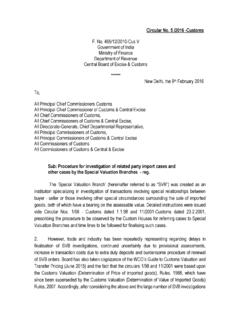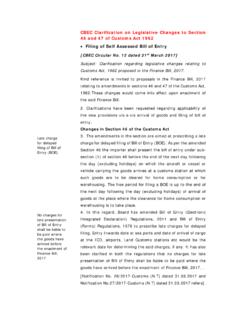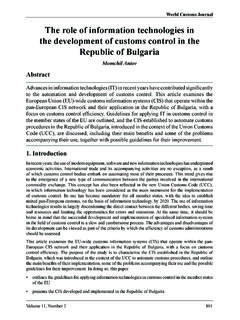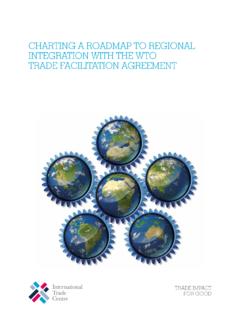Transcription of ANNEXURE 1 to APPENDIX 2C Certification of Origin …
1 ANNEXURE 1 to APPENDIX 2C. Certification of Origin of Goods for the EU Generalised System of Preferences (GSP)- Modification of the system as of 1st January 2017. Introduction: The EU has been continuously undertaking reforms of its GSP rules of Origin . One such reform finalised in 2011 relates to the self- Certification of the rules of Origin criteria by exporters themselves. The purpose of this reform is to facilitate trade and reduce administrative burden and costs for exporters. Under the new scheme of self- Certification , being introduced from , the current system of issuance of certificates of Origin (Form-A) by competent authorities as listed in APPENDIX 2C of Foreign Trade Policy (2015- statements on Origin statement on Origin commercial invoice etc.) of the exported consignment. However, during the transition period of twelve months from until , the competent authorities [as listed in APPENDIX 2C of the FTP. (2015-20)] would continue to issue certificates of Origin (Form A) at the request of exporters who are not registered in the REX system.
2 At the end of this period, from onwards, the 0 will be entitled to GSP preferential tariff treatment, only if accompanied by a statement on Origin made out by a registered exporter. Exporters consigning low on - As exporters are in the best position to assess the Origin of their products, the European Union considers it appropriate that the exporters directly pro statements on Origin need to be registered by the competent authorities in an electronic system, named the REX system, or The competent authorities would have access to the REX system for registration of exporters as well as access to relevant information. The registration of exporters in the system will not require any fees. An exporter will be registered in the system only once and the REX system will be common to the GSP schemes of the European Union, Norway, Switzerland and Turkey (based on Turkey fulfilling certain conditions). The REX is a composite system relating to both registration of exporters and all other aspects related to the self- Certification of the rules of Origin under the EU GSP.
3 The rules of the REX system are Customs Code (UCC) "Implementing Act"(IA)]. The details on the REX system are available at the following URL: preferential- Origin /arrangements-list/ge neralised-systempreferences/the_register _exporter_system_en Questions and Answers on the reform of GSP rules of Origin can also be assed at While the REX system will come into operation on and exporters will be able to submit their applications for registration under REX , the registration on the REX System will only be done when EU operationalizes the system and gives access to the system to competent authorities in India. Exporters may submit their applications to the competent authorities as listed in ANNEXURE 1(b) who will receive such applications, verify the details therein and if accepted, these applications will be registered on the REX once their access to REX is permitted. Upon registration with email and a communication at the address indicated in the application form. 2. Tasks and responsibilities of the competent authorities under the REX system: Under the EU GSP self- Certification system, all the beneficiary countries would have two types of competent authorities namely.
4 I. Competent authority for administrative cooperation (ADC) which interfaces with the EU on issues related to the EU GSP and takes overall policy decisions on the EU GSP. ii. Competent authority for registration (REG) which is responsible for registration of exporters through local users as also assistance related to verification. Each of these competent authorities must have at least one local administrator namely i. Local administrator(s) for administrative cooperation (ADC). ii. Local administrator(s) for registration (REG). The role of the local administrators is to create local users in their competent authority. Hence, the Local Users for registration (REG) would be created by the Local Administrators for registration (REG). The exporters would need to approach these local users for registration (REG) to undertake a one time registration for exports under the EU GSP self- Certification . The Department of Commerce is the Local Administrator of India for Administrative Co- operation (ADC) under the EU GSP self- Certification scheme.
5 Besides, the Department of Commerce, India would have sixteen Local Administrators for Registration (REG). The Local Administrators for Registration along with the name of their nodal officers, designation, email id and telephone numbers is listed at All these Local Administrators would access the REX system through their ECAS IDs. The Local Administrators for Registration on the request of the Local Administrator for Administrative Cooperation ( the Department of Commerce) will also provide all support requested by the Commission for the monitoring of the proper management of the scheme in the country, including verification visits on the spot by the Commission or the customs authorities of EU Member States. The Local Administrators for Registration would nominate and create the Local Users for Registration (REG) in the REX system through their ECAS IDs. This would have to be done by logging into the T-REX (sub-component of the REX system).and registering the local users.
6 Local Administrators for REG would also train the Local Users in registering exporters under the REX system. Local Administrators for REG will maintain updated record of its Local Users for Registration (name, address, email id and phone no.) and intimate any change in details of Local Users for Registration to EU / Switzerland / Norway administrators and to Department of Commerce at the following email IDs The Local users for Registration (REG) nominated by the Local Administrators for Registration are at Updates on the REX system can be viewed at The Local Users for Registration shall undertake the following tasks: i. Disseminate information on the REX system to exporters and other stakeholders;. ii. Receive signed applications for registration in REX from exporters in the requisite format ( ANNEXURE -"1C"). The REX system provides for a Pre-Application component (AREX Form). which allows exporters to fill their details in a REX Pre-Application form and print it. The same can be signed and submitted manually to the Local User.
7 When being processed, the Local User will /Importer Exporter profile. iii. Register Exporters on REX, using either details from Pre-Application (AREX Form) or using details from the paper based application signed and submitted by the exporter;. iv. Check whether the applications submitted contains all the information required;. v. Check that the applicants are established and functional manufacturers or traders, and their Importer Exporter Code (IEC) is not under DEL(Denied Entity List);. vi. Enter information about the exporters into the REX system and assign registered exporter (REX). number, in the 20 digit format namely INREX [10 digit IEC number]- [2 digit alphabetical code for Local Administrator]-[3 digit numeric code for Local User for Registration beginning from 001. until 999]. The two digit alphabetical code for Local Administrator for Registration is given in APPENDIX IA while the term "INREX" stands for India REX,);. vii. Inform exporters of their REX number; date of registration in REX any other relevant details through both email and a hard copy.
8 The date from which the registration is valid should be the date on which the complete application was received by the Local User;. viii. Store the application form in safe custody;. ix. Keep the electronic record of registered exporters up-to-date;. x. Recommend to the Local Administrator for Registration, the registration if the exporter: a. no longer exists, no longer intends to export goods under the GSP or no longer meets the conditions for exporting goods under the GSP;. b. intentionally or negligently draws up, or causes to be drawn up, a statement on Origin which contains incorrect information and leads his customer to wrongfully obtaining preferential tariff treatment in the EU;. c. fails to keep information relating to his registration up-do-date, where this shortcoming is considered to be serious;. xi. inform registered exporters whose registration has been revoked on the action taken for revocation of the date from which the revocation will take effect xii. carry out regular checks, verification and audits on registered exporters, based on the requests of EU Member States Or after obtaining the consent of both the Local Administrator for Registration (REG) and the Local Administrator for Administrative Cooperation (ADC).
9 The fees charged for checks, verification and audits will commensurate with the cost of services rendered. The Local User for Registration (REG) will provide details of the fees to be charged by it (including a rough estimate of the total cost to the exporter) to both the Local Administrator for Registration (REG) and the Local Administrator for Administrative Cooperation (ADC). xiii. Re-registration of the exporter based on the due process of checks and based on recommendation of the Local Administrator for Registration (REG). xiv. Send on a monthly statements on Origin Registration and the Local Administrator for Administrative Cooperation (ADC). In accordance with Article 93 of the reformed EU GSP rules of Origin under Regulation 2015/2447 the competent authorities must revoke a registration if the registered exporter no longer exists, no longer intends to export goods under the GSP or no longer meets the conditions for exporting goods under the GSP. Without prejudice to the system of penalties and sanctions applicable in the beneficiary country, tariff treatment the Local Administrator for Registration.
10 The Local User for Registration may also recommend revocation to the Local Administrator for Registration if the registered exporter fails to keep information relating to his registration up-to-date and this shortcoming is considered to be serious. Without prejudice to the possible impact of irregularities found on pending verifications, revocation of the registration can only take effect for statements made out after the date of revocation. Exporters whose registration has been revoked may only be registered again if they prove that they have remedied the situation. An appeal against the revocation and annulment of the Registration of an exporter shall lie with the Local Administrator for Administrative Cooperation (ADC). 3. Tasks and Responsibilities of the Registered Exporters under the REX System To be registered, an exporter must file an application with one of the Local Users for Registration (REG). The selection of the Local User for Registration (REG) is to be made taking into account the products being exported, nature of the unit (SEZ or DTA) etc.







